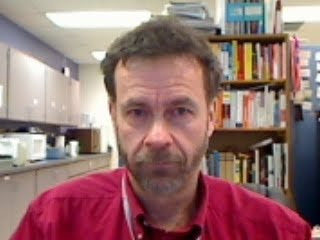Richard Washer is our guest today. He is a playwright, director, and educator, and currently serves as Company Dramaturge at Charter Theater. His most recent play, "The Fetish," was produced at The National Conservatory of Dramatic Arts in December, 2008. His play "Quartet" was performed at the Hamner Theatre in Nelson County, Virginia in April of 2009. He has led Playwriting and Mixed Genre workshops at The Writer’s Center since 1995, and he'll be taking over for Michael Kinghorn on the workshop "Playwriting from Scratch" beginning May 1.
I recently attended the American College Theatre Festival (ACTF) held at the Kennedy Center, an annual springtime event that celebrates the talents and accomplishments of university students and their instructors from schools across the nation. As both a playwright and an educator I was reminded of the challenges faced by those who attempt to guide others through the creative process of writing plays. I know some of these university teachers and I am humbled by their unflagging energy, enthusiasm, and dedication. I also know they face the same challenges as I do: how do you teach this stuff?
Actually, I resist the label of teacher and in workshops I make a point to introduce myself as a facilitator, a guide, and later in the process of developing a play, as a dramaturge. Most writers I know agree that writing is a process of discovering one’s voice, or at the risk of sounding a little precious, a journey of self-discovery. I can’t teach that voice. What I can do is share the craft and encourage the discovery.
That’s all very nice, but how does one go about doing this? I have been wrestling with that question in the twenty-some years I have led workshops. Similar questions motivated me in the first years of Charter Theatre, when I set up an outline for a developmental process that is only now (thirteen years later!) being realized and refined by the talents and energies of director and playwright Leslie Kobylinski and dramaturge Suzanne Maloney.
The basis for the developmental process at Charter Theatre grew from a fundamental precept for writing in general: writers learn by writing and rewriting. Extrapolating from that I argue that playwrights learn more from the rehearsal process (and the subsequent rewrites) than any other method. At Charter the idea was to bring in actors and rehearse the script with the playwright in the room where he or she would listen to the actors question, grapple, and improvise ideas with the script. This was not a new idea, but the implementation and logistics remain a challenge today (cost, schedules, rehearsal space).
This approach yields a benefit almost immediately: elements of craft rise out of the world of theory and become practical tools; theory becomes palpable as the words on the page leap to life through the actors. However, I have always been frustrated by how few playwrights we can serve in this manner. Playwriting presents challenges similar to the composer or arranger who has to know the qualities and limitations of musical instruments in order to write for them. The requirements for a playwright is perhaps less demanding, but the more familiarity the writer has with the collaborative nature of theatre, the better.
Recently, working with some high school seniors, I applied this rehearsal principle to my workshops and looked for ways to simulate the process of working with actors on a script. This included asking questions the actors might ask, or exploring some scenes where I take on the role of director. The limitations of this approach is the lack of acting experience among the writers in the room, so another solution is co-teaching the workshop with an actor and in some cases bringing in actors periodically during the course of the workshop. This makes the workshop more engaging and provides the writers in the room with insights won through discovery as opposed to theories discussed in the abstract.
Nothing can replace a full rehearsal process for production (and the terrifying experience of an audience watching your work); this is the ultimate teacher for the beginning or even seasoned playwright. But those opportunities are woefully scarce. Based on what I observed at the Kennedy Center festival, universities provide wonderful production opportunities for student writers. However, this experience may not be replicated for many of these students in the years after they graduate, when they will join a legion of playwrights striving to grow as writers. I remember the frustration and struggle of that growth. I suppose for that reason I continue to look for ways to offer what I longed for as a young playwright: practical ways to learn practical lessons.


No comments:
Post a Comment